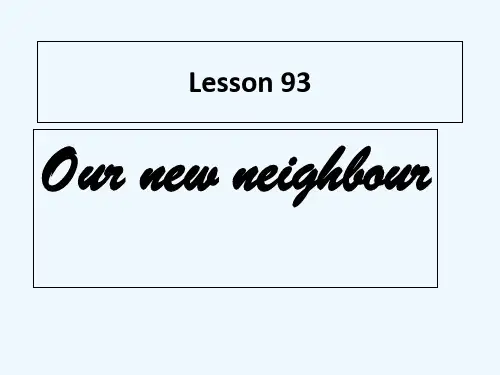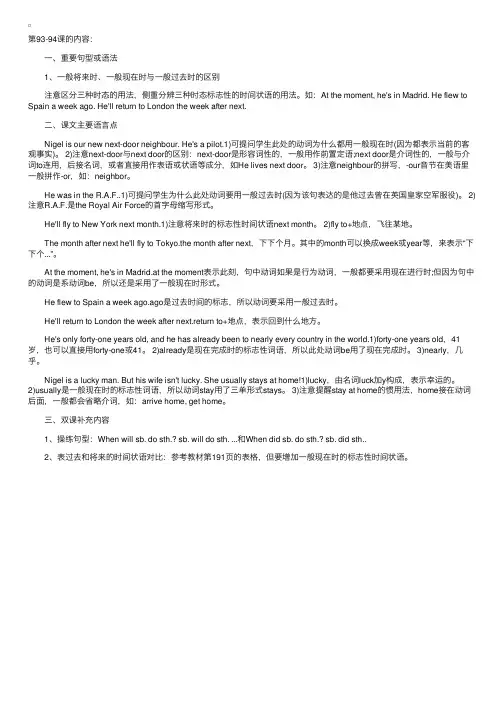新概念英语第一册93-94课(共54张)
- 格式:pdf
- 大小:10.47 MB
- 文档页数:54








第93-94课的内容: ⼀、重要句型或语法 1、⼀般将来时、⼀般现在时与⼀般过去时的区别 注意区分三种时态的⽤法,侧重分辨三种时态标志性的时间状语的⽤法。
如:At the moment, he's in Madrid. He flew to Spain a week ago. He'll return to London the week after next. ⼆、课⽂主要语⾔点 Nigel is our new next-door neighbour. He's a pilot.1)可提问学⽣此处的动词为什么都⽤⼀般现在时(因为都表⽰当前的客观事实)。
2)注意next-door与next door的区别:next-door是形容词性的,⼀般⽤作前置定语;next door是介词性的,⼀般与介词to连⽤,后接名词,或者直接⽤作表语或状语等成分,如He lives next door。
3)注意neighbour的拼写,-our⾳节在美语⾥⼀般拼作-or,如:neighbor。
He was in the R.A.F..1)可提问学⽣为什么此处动词要⽤⼀般过去时(因为该句表达的是他过去曾在英国皇家空军服役)。
2)注意R.A.F.是the Royal Air Force的⾸字母缩写形式。
He'll fly to New York next month.1)注意将来时的标志性时间状语next month。
2)fly to+地点,飞往某地。
The month after next he'll fly to Tokyo.the month after next,下下个⽉。
其中的month可以换成week或year等,来表⽰“下下个...”。
At the moment, he's in Madrid.at the moment表⽰此刻,句中动词如果是⾏为动词,⼀般都要采⽤现在进⾏时;但因为句中的动词是系动词be,所以还是采⽤了⼀般现在时形式。



【句法】and 在这里表示转折,相当于“but”【词法】forty-one years old 41岁41-year-old man 41岁的男人【即学即用】语篇填空Nigel is our new next-door neighbour. He’s pilot. He was in the R.A.F. He (fly)to New York next month. The month next he will fly to Tokyo. At the moment, he’s in Madrid. He (fly)to Spain a week ago. He’ll return to London the week after next. He’s only forty-one years old, and he has already been to nearly every country in the world.Nigel is a very lucky man. But his wife is very (lucky). She usually (stay)at home.【编写对话】When did you/will you go to ...?你过去/将来什么时候去...?【语法小课堂】时态综合练习1. If you work hard, you____________(achieve) your dream one day.2. If you___________(take) out the rubbish tomorrow, I won’t.3. I__________ already___________(see) this movie, I_________(see) it last year.4. My father_______________(read) newspapers when I got home from school.。